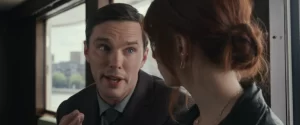
The following essay includes plot details including the major twist in Mark Mylod’s feature film The Menu.
The Menu has been principally viewed as a class focused social satire with strong elements of horror. Even the characters, such as Chef Slowik (Ralph Fiennes) refer to each other by class distinction, ‘Givers’ and ‘Takers.’ Slowik bemoans the fact that his artistry has reached a price point where the only people with the means to experience it are constitutionally incapable of enjoying it as they are never satisfied. The ultra-wealthy consume mindlessly, the act of consumption becoming merely a peacocking display utterly devoid of enjoyment, meaning, or even memorable. One set of characters are revealed to have spent nearly 28,000 dollars experiencing Chef’s artistry and yet fail to recall a single clear instance of it.
Beyond the social economic class divide between the service industry artists of Chef, his staff, and wealth patrons The Menu also holds sharp biting commentary of the Uber-Fan, represented by Tyle (Nicholas Hoult.)
While Tyler is in fact a member of the wealth class, he mentions the price of the exclusive dinner, $1250 per person, without even the slightest hesitation or hint of trouble at this extravagance. It is also clear that Tyler is well off since he can hire an expensive escort for an evening date. That said Tyler is not here because he is wealthy, ruined Chef’s day off with a pitiful performance, or has failed to appreciate the artistry, but rather he is precisely for because his slavish adoration of Chef and his ‘experience’ is an example of the taxic fan that disgraces the art for both the artist and consumer.
Tyler, like a devoted franchise fa who can quote every obscure fact of legendary lore, has buried himself in the minutia of technique but without any understanding or comprehension of art’s meaning. While horrors unfold around him, dismemberment and suicide, Tyler is lost in the taste and texture of the menu’s courses.
Desperate for validation and as a vainglorious showboat Tyler takes every opportunity to demonstrate his deep knowledge or culinary tools and techniques while simultaneously snubbing and disparaging his companion for her own tastes and interests. He berates ‘Margot’ (Anya Taylor-Joy) for ruining her palate with cigarette smoke and demeans her intelligence when it comes to Chef’s final thematic point. “You won’t figure it out until the end.”
Later it is revealed that not only it was Chef’s intent that the culmination of the evening was that everyone was doomed to die but that Tyler was already fully aware of this. Tyler, utterly obsessed with experiencing Chef Slowik’s extraordinary talents, is willing to die for a single evening meal at the exclusive restaurant. Even more horrifying Tyler engaged a professional escort, ‘Margot’, when his original date broke up with him. Tyler held everyone else in contempt, holding himself above and apart from the rabble due to his deep knowledge and understanding to the culinary arts.
However, he was blind to Chef’s disdain for him. Tyler’s obsession is not the honor that Chef wants for his skill. Slowik hates Tyler for his pathetic, fawning, idolization and it was not enough for Chef that Tyler die along with himself, the staff, and the other diners, but Tyler’s humiliation was required.
Turning into the film third act, Chef Slowik pulls Tyler from his seat and, after dressing him as a chef, brings him into the kitchen to display his own culinary talents.
Of which Tyler has none.
Like so many dedicate, noisy, bossy, and opinionated fanboys Tyler when faced with creating a work in the art he knows so well fails miserably producing the supplemental course labeled Tyler’s Bullshit. For all his posturing, pronouncements, and peacocking Tyler is revealed an empty vessel with nothing of his own to contribute.
Chef words, unheard by the audience, destroys what little remained of Tyler and prompting Tyler’s suicide. The obsessive fan, and it is wise to remember that the word ‘fan’ is derived from ‘fanatic,’ corrupt the art that they profess to love. They have replaced understanding with minutia, promoting with gatekeeping, and empathy with arrogance.
Real art and real appreciation require humility as well talent and understanding.



